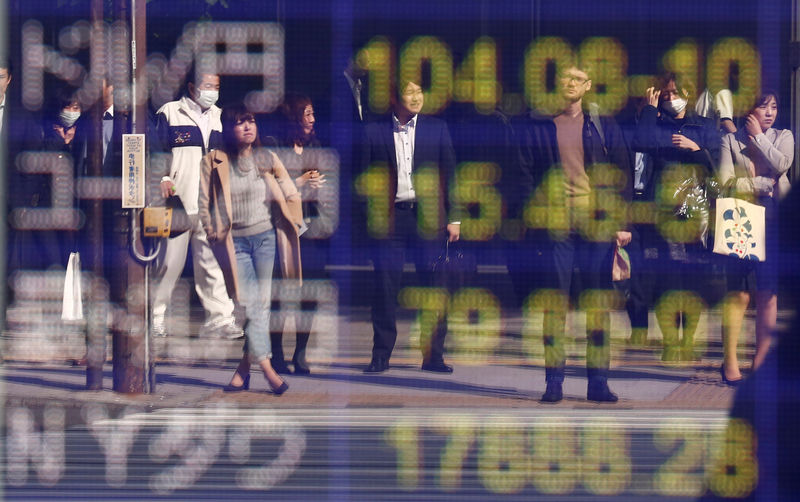By Hideyuki Sano
TOKYO (Reuters) - A searing selloff rocked Asian shares and emerging market currencies on Friday as investors feared higher U.S. interest rates under incoming President Donald Trump will spark capital outflows from the region.
European shares are expected to open slightly higher after moderate losses in the previous session, with spread-betters seeing major European indexes, such as Britain's FTSE (FTSE) and Germany's DAX (GDAXI), rising 0.1 to 0.4 percent.
MSCI's broadest index of Asia-Pacific shares outside Japan (MIAPJ0000PUS) fell 1.4 percent as U.S. bond yields continued to soar on views that Trump's spending plans will push up inflation, possibly triggering more aggressive rate hikes by the Federal Reserve.
Emerging markets bore the brunt of selling, with MSCI emerging market (MSCIEF) index falling 1.5 percent to its lowest level since July, with Indonesia and Malaysia hit the hardest in Asia.
Indonesian shares (JKSE) slumped 3 percent while the rupiah currency
The Malaysian ringgit
Japan's Nikkei (N225) bucked the trend, rising more than 1 percent to 6-1/2-month highs the yen weakened against the firming dollar.
On Wall Street, the U.S. S&P 500 Index (SPX) rose 0.2 percent while the Dow Jones industrial average (DJI) jumped 1.2 percent, smashing through its previous record high set in August by almost 1 percent.
In contrast, the technology-heavy Nasdaq fell 0.8 percent (IXIC), with Apple (NASDAQ:AAPL)
"The market's focus has shifted to Trump's policy after the initial knee-jerk risk-off reaction. The markets think he is likely to protect the U.S. domestic economy, especially the old economy," said Koichi Yoshikawa, executive director of financial markets at Standard Chartered (LON:STAN) Bank.
"That explains why the Dow was up and the Nasdaq was weak," he added.
The financial sector (SPSY) surged 3.7 percent to its highest since the 2008 global financial crisis, as Trump has sided with leading conservatives in calling for the repeal of the 2010 Dodd-Frank Financial Reform Act largely opposed by banks.
U.S. bond markets have also seen dramatic moves since Trump's victory, with the 10-year U.S. Treasury yield hitting their highest levels in 10 months.
Expectations that his policy stance - from protectionism and fiscal expansion - will boost inflation have been driving the surge in U.S. yields.
"You have fiscal policy that will widen the deficit by trillions of dollars in a decade, and if there's a 20 percent tariff on imports from China, that alone would boost inflation by one percentage point," said Tomoaki Shishido, fixed income analyst at Nomura Securities.
The 10-year U.S. yield (US10YT=RR) rose to 2.15 percent, almost 30 basis points, or 0.30 percentage point, above its levels around 1.86 percent just before the U.S. election on Tuesday.
Inflation expectations measured by U.S. inflation-linked bonds
The 30-year yield (US30YT=RR) rose 38 basis points, posting its biggest weekly jump since 2009 before a U.S. market holiday on Friday.
Soaring U.S. yields have been a boon to dollar bulls. The euro dipped to $1.0908
The dollar strengthened sharply against the yen, which has traditionally a strong inverse correlation with U.S. yields because higher U.S. yields encourage Japanese investors to buy more U.S. debt.
The dollar rose to as high as 106.95 yen
Emerging market currencies were hammered by concerns investors could pull back their funds out of higher-yielding emerging assets and move them back to the U.S.
Apart from the Indonesian rupiah, the Mexico peso has fallen 7.5 percent so far this week, hit by Trump's threat to scrap the country's key free trade agreement with the United States and build a massive wall along the border.
The Brazilian real
The South Korean won
Markets are expecting the U.S. Federal Reserve to go ahead with a rate hike in December after U.S. markets quickly stabilised from the initial Trump election shock.
The money market futures
In a remarkable shift of sentiment, the market is also now starting to price in a chance of a rate hike by the European Central Bank for the first time since 2011.
Debt yields are rising in Europe as well, with 10-year German Bunds yield hitting an eight-month high of 0.32 percent (DE10YT=RR).
The 10-year yield in Italy, rocked by concerns Prime Minister Matteo Renzi may resign if he loses the Dec 4 referendum on constitutional reform he pushed for, shot up to 1.95 percent (IT10YT=RR), its highest level in 14 months.
Elsewhere, oil prices eased as the market looked to whether OPEC will decide later this month to cut production to address long-running over supply concerns.

U.S. crude futures (CLc1) fell 0.4 percent to $44.48 per barrel.